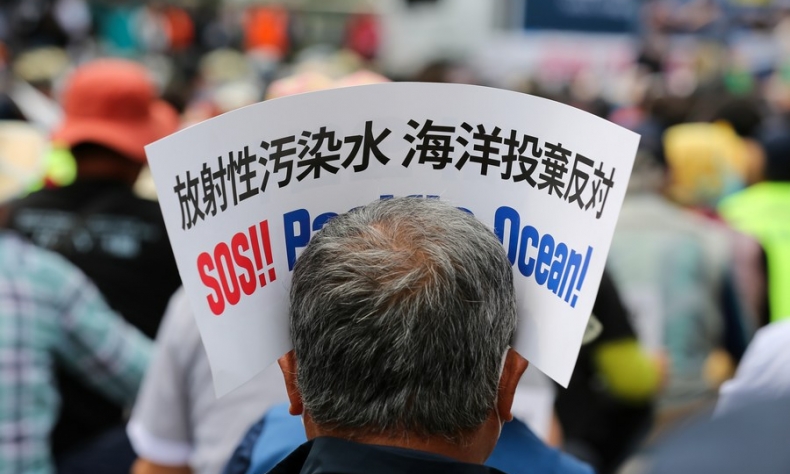Fukushima Presents Problem for Japan-ROK Relations

Yoon’s overarching agenda has been to push ROK closer to Japan in foreign policy. He has shown he will not shift his trajectory, whatever the public thinks, but the public might deal his party a blow in the 2024 elections.
South Korean fishers are protesting Japan’s plan to release treated wastewater from the Fukushima disaster into the Pacific Ocean. Those who made their livelihood from harvesting the bounty of the sea are worried that the radioactive water, a byproduct of the earthquake and tsunami that struck the Fukushima Daiichi Nuclear Power Plant in 2011, will poison sea life and harm demand for their products.
I am not a scientist. I have read conflicting opinions from scientists and environmentalists concerning the safety of the plan to dispose of the Fukushima water. A 2021 paper by four maritime researchers arrived at the conclusion that the release of the water could wipe out $220 billion in global GDP. The countries that will be most impacted over 10 years, as the water would disperse over time, include Japan, China, South Korea, the DPRK, Russia, Vietnam, Indonesia, Canada, Mexico, and the United States.
South Korean civic groups, along with the U.S. National Association of Marine Laboratories and the Pacific Island Forum, have called for Japan to refrain from releasing the water. At the same time, the International Atomic Energy Agency has endorsed Japan’s plan and said it complies with international standards.
I can’t speak to the credibility of either side of the debate, but I can speak to the impact of the news on politics and international diplomacy. At a time when South Korea’s administration is putting much effort into improving relations with Japan, the South Korean public is strongly opposed to the release of the water. This issue has the potential to disrupt ROK President Yoon Suk-youl’s continuing outreach to Japanese Prime Minister Fumio Kishida.
A survey of 1,000 adults in May found that 85.4% of South Koreans do not want Japan to release the water. Furthermore, 79% do not believe the Japanese government’s statements concerning the matter.

Regardless of what the Japanese government thinks about their plan, they have to address the diplomatic fallout. South Korea and Russia are the two nearest countries to Japan. Over 7,000 South Koreans are directly employed in the fishing industry. There are even more employed indirectly as wholesalers, fishmongers, and chefs. Fresh fish markets where you can have your fish cut into raw hoe (hui in Chinese) are popular.
The Japanese government has lost its credibility for decades with the South Korean people because of its lies about historical issues. Japan continued to deny that it had forced women into sexual slavery during World War II (“comfort women”), committed war crimes across Asia, and coerced men into forced labor. The forced labor issue caused the latest degradation in ROK-Japan relations. The highest court in South Korea ruled that the forced labor victims were entitled to compensation, but the Japanese companies and the Japanese government refused to pay.
The new ROK president elected in 2022, Yoon Suk-youl, pledged to repair relations with Japan. But rather than negotiating a compromise, Yoon simply gave up the South Korean government’s demand that the compensation be paid. Even after such favorable actions from the Yoon administration, Japan responded by approving a new history textbook that denied that forced labor ever took place.
Yoon’s approval rating was already extremely low before he made the one-sided “deal” with Japan. It didn’t decline much since then. In fact, in May, his approval rating rose four points from 27% to 31%. Once it gets this low, it can’t fall much further – his only supporters left are his hardcore loyalists.
Yoon has been accused of not demanding assurances from Japan. His prime minister, Han Duck-soo, said he was so confident in Japan’s plan that he would drink the water himself if offered. South Korea sent inspectors to Japan at the end of May, a visit that was highly touted by Yoon, but the opposition party claimed the inspectors did not have sufficient access and were only meeting with “public relations representatives.” John Lee, a columnist for Korea Pro, wrote that the visit could “backfire” on Yoon, as it appears that it is just a political act of goodwill between the two countries.
Yoon’s overarching agenda has been to push ROK closer to Japan in foreign policy. He has shown he will not shift his trajectory, whatever the public thinks, but the public might deal his party a blow in the 2024 elections.
 Facebook
Facebook
 Twitter
Twitter
 Linkedin
Linkedin
 Google +
Google +










